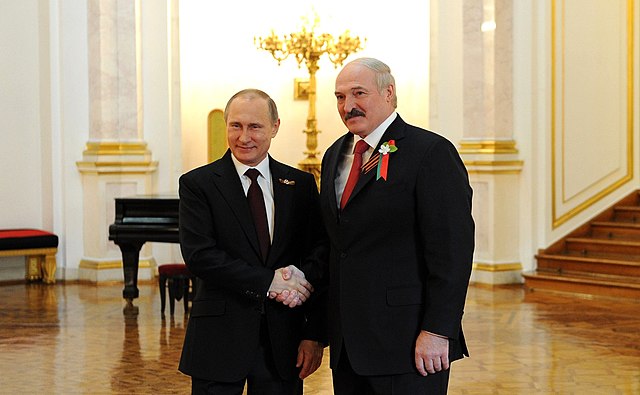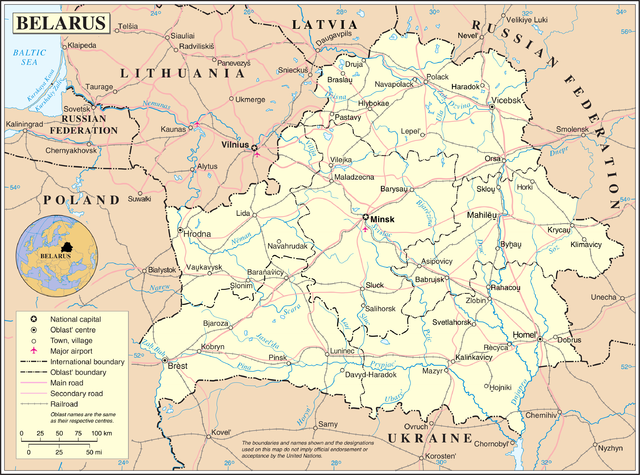Belarus to join Russia?
April 27, 2019 | Expert Insights

President Vladimir Putin may look beyond Russia for a window to retain the status quo after his current term ends. Is he looking to force Belarus’ integration with Russia as a way of staying in power beyond his last term?
Background
Belarus is a landlocked country in Eastern Europe bordered by Russia to the northeast, Ukraine to the south, Poland to the west, and Lithuania and Latvia to the northwest. Its capital and the most populous city is Minsk. Over 40% of its 207,600 square kilometres (80,200 sq mi) is forested. Its major economic sectors are service industries and manufacturing.
Russia is the largest and the most important partner for Belarus both in the political and economic fields. The Treaty on Equal Rights of Citizens between Belarus and Russia was signed in December 1998, covering employment, and access to medical care and education. The two countries constitute the supranational Union State. Belarus hosts a Russian early-warning radar and a naval communications centre. However, it has so far resisted pressure from Moscow to permit a new military base on its territory.

Analysis
After years of spending billions of dollars to support Belarus’s state-dominated economy, Russia is intensifying pressure on President Alexander Lukashenko to demonstrate his loyalty by accepting deeper integration in return for continued aid. As a result, it is fuelling fears in Belarus that Russia is turning the screw as a prelude to possible absorption of its former Soviet satellite.
Those concerns may not be unfounded, according to three people close to the Kremlin, who said Putin may lay plans to head a unified state with neighbouring Belarus to sidestep a constitutional ban on remaining president after 2024.
While no decision has been taken on seeking a merger, which would risk opposition in both Russia and Belarus, Putin is increasingly impatient with Lukashenko. In addition, concerned that he may try to slip out of Moscow’s orbit, said the people, who requested anonymity discussing such a sensitive issue.
Already the longest-serving Russian leader since dictator Josef Stalin, Putin, 66, has repeatedly ruled out changing constitutional term limits to extend his rule. While he’s given no public indication of his plans beyond 2024, Kremlin officials are studying potential methods of keeping him in power. They include emulating Kazakh leader Nursultan Nazarbayev’s decision last month to step down as president while retaining political control; though analysts in Moscow are sceptical whether such a manoeuvre would work in Russia.
Largely dependent on Russian oil and gas supplies, Lukashenko’s feeling the pressure from new tax rules introduced by Moscow that he says, may lead to nearly $11 billion in losses for the country by 2024 through increased crude costs.
Many analysts have overlooked a key factor in this potential manoeuvre: Belarus and Russia already form a “supranational union” called the ‘Union State’. Under this Union State arrangement, Belarus and Russia retain their respective sovereignty over domestic issues like law and order, economy, foreign relations etc. Therefore, it can be compared to the African Union in terms of composition and function.
Therefore, Putin’s decision to push for further Russo-Belarussian integration is based on an existing framework. As of 2019, Belarus is the only former Soviet Republic to have a “special” relationship with Russia, making it the optimal candidate for deeper incorporation with Russia.
Assessment
Our assessment is that Alexander Lukashenko will try his best to prevent complete assimilation into Russia. He is aware that Moscow still has the ability to inflict a significant economic shock if they refuse Putin’s proposal. We feel that Lukashenko’s unpredictable nature will pose an interesting question to NATO, which has expressed hope for more significant expansion in Post-Soviet states. We also feel that Putin could be aiming to retain power after the end of his Presidential term in 2024 in a manner similar to one adopted by Nursultan Nazarbayev. He could vacate the position but retain a majority of the political power.
Image Courtesy: Kremlin.ru, Putin with Alexander Lukashenko 2015, CC BY 4.0








Comments